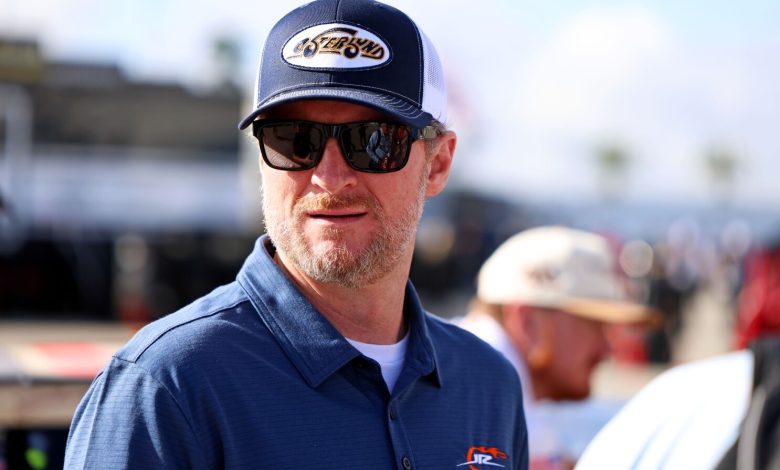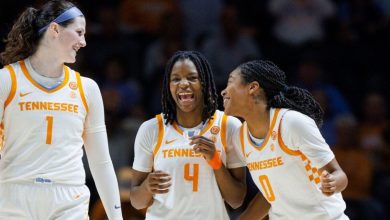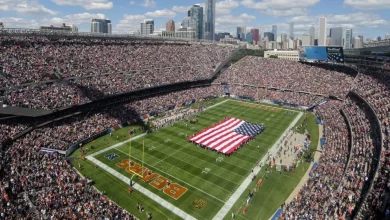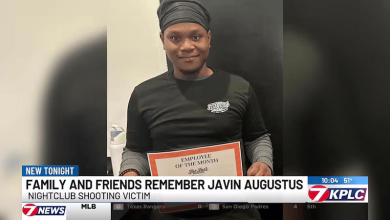Lamar Jackson and Dale Earnhardt Jr. resolve trademark dispute, clearing the way for Jackson’s unique brand development.

The intersection of sports, branding, and business has always been an essential part of an athlete’s career. For elite athletes like Lamar Jackson, their on-field performance can often be outshone by their ability to market themselves off the field. In recent years, the growing importance of an athlete’s personal brand has taken center stage, with endorsements, merchandise, and social media presence becoming integral to their overall financial portfolio. However, building a brand isn’t always a smooth process, and sometimes legal issues arise, as was the case with Lamar Jackson and his recent trademark dispute with NASCAR legend Dale Earnhardt Jr.
The dispute was based around Jackson’s attempt to trademark a unique logo, one that was similar to a logo that Earnhardt Jr. had already secured for his brand. What followed was a significant legal battle that garnered considerable attention, as fans and industry experts alike were eager to see how the situation would play out. Fortunately for both Jackson and Earnhardt Jr., the two came to an amicable resolution that not only cleared the way for Lamar Jackson to move forward with his brand development but also allowed the two athletes to collaborate and create new opportunities moving forward.
The Dispute: A Clash of Brands
Lamar Jackson, the Baltimore Ravens’ star quarterback, is no stranger to the spotlight. Having won the NFL MVP award in 2019 and consistently proving himself as one of the league’s most electrifying players, Jackson’s appeal extends far beyond the football field. His charisma, combined with his dynamic playing style, made him a natural candidate for endorsements, partnerships, and even his own personal brand. However, when Jackson attempted to trademark a logo that resembled Dale Earnhardt Jr.’s famous “8” logo—already established in the world of NASCAR—it sparked a legal dispute.
Earnhardt Jr., one of NASCAR’s most iconic drivers and an influential figure in the motorsport world, had already secured the rights to the number “8” and its associated logo for his own brand. As a result, when Jackson’s legal team sought to file a trademark for a logo that was visually and conceptually similar, it raised red flags. Both Jackson and Earnhardt Jr. had similar interests in developing their personal brands, but their logos were at the heart of the issue.
The legal dispute stemmed from the fact that both athletes were attempting to dominate in their respective fields, with the potential for overlap in fanbases, merchandise, and intellectual property. While both men had a reputation for excellence in their respective sports, they now found themselves at odds over a logo that represented more than just a simple design; it was an essential piece of their personal brands.
The Importance of Trademarks in Building a Personal Brand
For athletes like Lamar Jackson, trademarks are an essential tool in their off-field success. A trademark protects the intellectual property of an athlete’s name, logo, catchphrases, or other aspects of their brand, ensuring that no one else can legally use them without permission. This protection allows athletes to monetize their popularity and build lucrative deals with brands, merchandise, and endorsements.
For Jackson, who has already established a strong personal brand with his charismatic personality and impressive performances on the field, the trademark dispute was a significant hurdle. His brand was beginning to take off, and having control over his image and branding was crucial for his long-term financial security. Any delay or legal entanglement would potentially put his off-field plans in jeopardy.
Earnhardt Jr., on the other hand, understood the value of trademarks, especially as someone who had been successful not only on the racetrack but also in building his own media empire. With his “8” logo and his extensive involvement in the NASCAR world, Earnhardt Jr. had carefully cultivated a brand that included merchandise, fan engagement, and media presence. The potential overlap of the logos threatened to confuse consumers and dilute the power of each individual’s brand.
For both men, the resolution of this dispute was necessary to protect their brands and maintain clarity for their respective audiences.
The Resolution: A Win-Win for Both Parties
After months of back-and-forth negotiations, both Lamar Jackson and Dale Earnhardt Jr. were able to resolve their trademark dispute without further legal action. Rather than engaging in a lengthy and costly court battle, both athletes and their legal teams found common ground, allowing Jackson to move forward with his brand development without infringing on Earnhardt Jr.’s established intellectual property.
The resolution was reportedly reached through a series of discussions that involved both parties, their legal teams, and business advisors. The deal, which was kept under wraps initially, allowed Jackson to file for a new logo and trademark that would reflect his personal brand and vision, without stepping on Earnhardt Jr.’s established territory. While details of the settlement were not made public, the outcome seemed to be a win-win for both sides.
One key element of the resolution was that both Jackson and Earnhardt Jr. agreed to collaborate on certain projects moving forward. This collaboration would leverage the star power of both athletes while providing an opportunity to unite their fanbases. For Jackson, having the backing and mentorship of a respected veteran like Earnhardt Jr. could only bolster his own brand’s credibility and marketability. The two could work together on a range of ventures, including merchandise, charitable initiatives, and joint ventures that would appeal to their shared fanbase.
For Earnhardt Jr., the resolution allowed him to maintain his brand’s integrity while showing support for a rising star like Jackson. Given Jackson’s immense popularity and appeal, partnering with him could enhance Earnhardt Jr.’s legacy and bring his brand to new heights, especially with a younger audience.
The partnership also sets a precedent for athletes navigating similar trademark issues in the future. With the rise of social media influencers and cross-industry collaborations, there is a growing need for athletes to carefully protect their intellectual property while also remaining open to collaboration. The resolution of this dispute shows that it’s possible for athletes to safeguard their brands without resorting to lengthy and damaging legal battles.
The Impact on Lamar Jackson’s Brand Development
With the trademark dispute behind him, Lamar Jackson can now focus fully on developing his brand. One of Jackson’s standout qualities is his authenticity, and this is something he’s worked hard to convey in his public persona. He’s often seen as a player who is unapologetically himself, both on and off the field, and this has resonated with fans across the NFL. This unique appeal is what has made him an attractive partner for brands and endorsements, as companies look to align themselves with athletes who embody authenticity and relatability.
Moving forward, Jackson can now explore new opportunities for brand collaborations, merchandise, and even media ventures that reflect his personal style. He has the potential to be one of the most marketable athletes in the NFL, particularly given his exciting playing style and larger-than-life persona. The resolution of the trademark dispute clears the way for Jackson to capitalize on these opportunities.
One area where Jackson’s brand could grow is in the realm of lifestyle and fashion. Much like other athletes who have ventured into the clothing and shoe industries, Jackson could use his logo and personal brand to launch a line of apparel, shoes, or accessories. His ability to resonate with both football fans and young, urban audiences positions him well for this type of venture. Collaborations with major fashion brands or even launching his own line could be a natural next step for Jackson as he builds his empire off the field.
Additionally, Jackson’s growing social media following and influencer status presents a unique platform for him to develop exclusive content, partnerships, and sponsorships with brands across various industries. Whether it’s fitness, tech, or lifestyle, Jackson has the potential to work with brands that align with his values and public image, further enhancing his earning potential and brand visibility.
The Bigger Picture: Athlete Branding in the Modern Era
The Lamar Jackson and Dale Earnhardt Jr. trademark dispute is a microcosm of the broader trend of athlete branding in the modern era. In the past, athletes were primarily known for their performance on the field or court, with limited influence over their image off the field. However, as the world has become increasingly connected through digital media, athletes now have direct access to millions of fans through social platforms. This access has allowed athletes to build multi-faceted brands that extend far beyond their sport.
Athletes like LeBron James, Michael Jordan, Serena Williams, and Tom Brady have shown the potential for athletes to create lucrative business ventures, from endorsement deals to product lines and media deals. Lamar Jackson, while still in the early stages of his career, is on a similar trajectory. His appeal as one of the NFL’s top quarterbacks and his off-field charisma make him a perfect candidate for long-term brand development. His situation with Earnhardt Jr. demonstrates the importance of protecting that brand through legal means and finding ways to navigate potential conflicts with other well-established figures.
The broader lesson here is that as athletes continue to dominate both on and off the field, they must take steps to protect their intellectual property, secure favorable business deals, and be willing to collaborate when appropriate. The Jackson-Earnhardt Jr. dispute serves as a prime example of the challenges athletes face in an era where their personal brand is just as important as their athletic performance.









